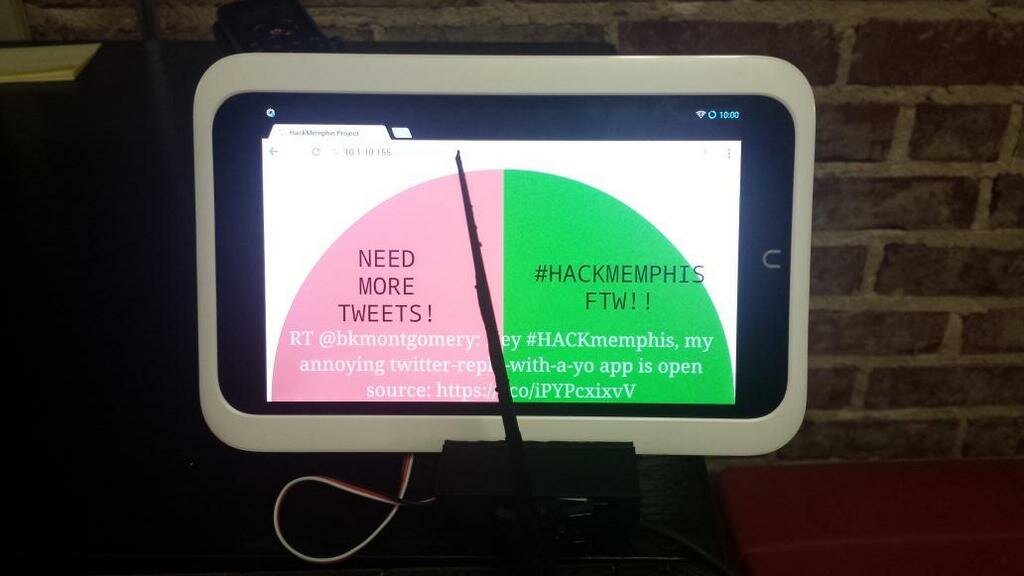This year I attended HACKmemphis for the first time, and it did not dissappoint. Several of my coworkers were on the planning committe with leading the charge. They did an amazing job putting on a weekend event for the Memphis tech community.
The hackathon kicked off Friday night, and I had two goals in mind:
- Make some progress on a ‘day-job’ related project.
- Polish up my upcoming talk for Nodevember.
Neither of these things happened.
The draw of the 3D Printers, Raspberry Pi’s, various doodads and thingamajigs, and the energy of the crowd in general was more than enough to pull me away from any ‘real’ work. During the brainstorming session, I came up with an idea that would allow me to play with as many things as possible in the shortest amount of time…
The Project
The result of my weekend hackery was an internet connected ‘meter’ that would indicate the intensity of Tweets with a given hashtag – a.k.a. the Tweet-O-Meter.
For the demo, I had the needle move forward (clockwise) every time someone tweeted ‘HACKmemphis’. The needle would recede every few minutes if a tweet didn’t appear.
Above is an early prototype that barely functioned Saturday evening. The software worked, and the meter indicator was a high quality mix of cardboard, paper and tape.
Below is the “finished” product with a freshly printed needle and a tablet based dial (that also displayed the most recent tweet). Photo credit: .
During Sunday morning’s show and tell session, the HACKmemphis Tweet-O-Meter demo went off without a hitch. Mission complete!
The Nuts & Bolts
Hands down, the best aspect of this (or any) hackathon is the collaboration. Event though I largely conceived of and built the Tweet-O-Meter myself, I couldn’t have pulled it off without input and assistance from the other attendeeds.
The Raspberry Pi and servo were graciously donated by the HACKmemphis sponsor SparkFun, and the representatives from GitHub ( and ) lent a helping hand getting it wired up.
The software running the show was all open source. NodeJS provided the plumbing, and the Cylon.js library helped get the parts moving.
whipped up a custom 3D model for the meter in a frighteningly short amount of time. The Mid South Makers brought a phalanx of 3D printers and were gracious enough to print all the necessary bits and peices for the Tweet-O-Meter, including:
- A custom stand / servo enclosure
- A custom needle (inconspicuously shaped like a certain web angency logo)
- A Raspberry Pi case
Also, for much of the weekend, I had a partner in crime (Jonathan L) building a mirror project with an Arduino instead of a R.Pi. Although we diverged quite a bit in our implementation, it was still very much a collaborative effort. There was plenty of back-and-forth and sharing of ideas.
Our code is up on GitHub for the curious:
Fellowship of the Nerds
Aside from smashing my fingers on keyboards, staring at glowing screens, and poking at Raspberry Pi pins, I did plenty of wandering around, eating, drinking, and carrying on with other attendees. There were plenty of familiar faces, but many new friendly folks to chat with as well. Thursday night’s GitHub sponsored drink-up was also super fun.
All-in-all, a great experience. The organizers did an amazing job, and I’ll be looking forward to next year.





Leave a Reply